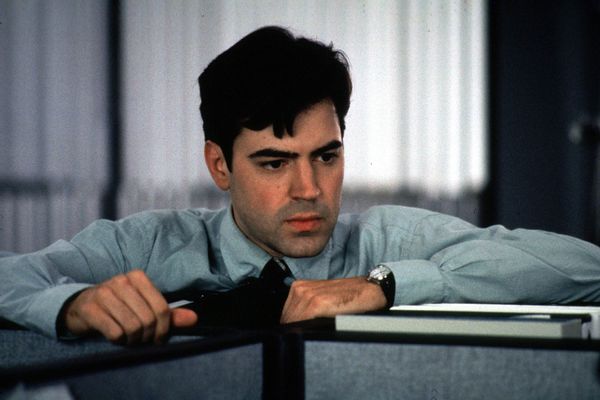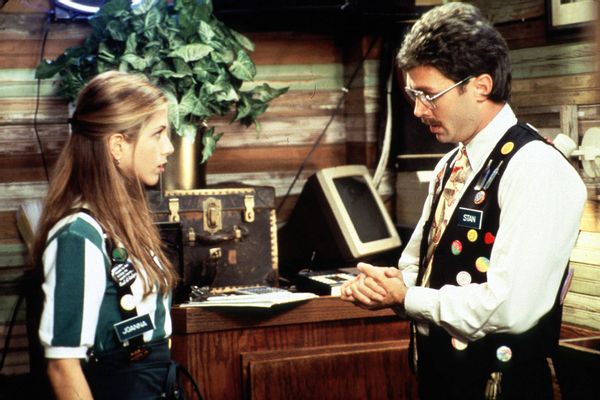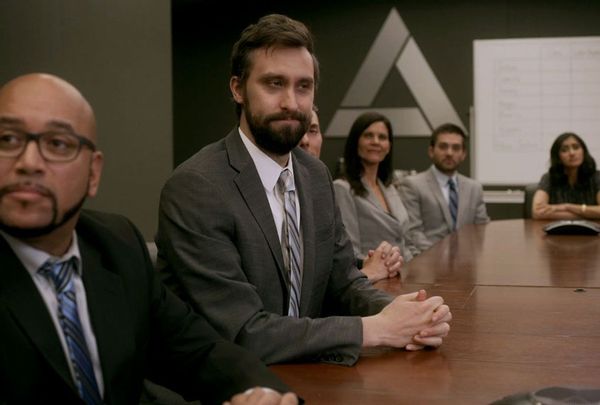Twenty five years later, “Office Space” explains the Gen X worker’s deflated spirit
Lately, I’ve encountered a slew of stories promising to decode the psychology of Gen Z workers. What motivates them? Which common assumptions about them are false? How can companies best avail themselves of this cohort’s native talents?
I don’t recall Generation X receiving proportional amounts of survey-driven empathy, but true to my age group’s stereotype, I probably wasn’t paying attention. Still, if my nostalgia-clouded memory serves me correctly, our alleged aimlessness and “whatever” philosophy is amply romanced in movies. Other generations seeking to understand us need only turn to John Hughes, who captured our glum teens, or any filmmaker who rosily chronicled our wasted 20s.
To this day, there remains no better Rosetta stone for deciphering the Nirvana generation’s view of work than 1999’s “Office Space,” Mike Judge’s paean to the plight of the X-er cubicle drone. To call the public’s response to its theatrical release tepid would be kind. The 25 years that transpired since have yielded a slew of theories as to why it didn’t hit bigger.
To this day, there remains no better Rosetta stone for deciphering the Nirvana generation’s view of work than 1999’s “Office Space.”
Let’s start with the obvious lack of marquee headliners in the cast: Jennifer Aniston was in it, but America’s favorite “Friend” wasn’t the main star. The story hangs on Ron Livingston’s Peter Gibbons, an unremarkable 20-something slouching through a McJob at a generically named bank software company called Initech.
Peter’s life is a sprawling stretch of bland. He works in an office plaza, lives in a shoebox apartment with vellum-thin walls and socializes at his choice of nearby casual dining establishments with names like Flingers and Chotchkie’s Bar & Grill.
The setting and main character’s lack of specificity might have been another box office damper at first. In the long run, however, they’ve contributed to the movie’s status as a cult hit. Peter is a blank space to whom any desk jockey can relate, which doesn’t take much if you subscribe to the idea of an average-looking white guy as the default white-collar worker.
Every other major character is a more familiar type. Stephen Root brings Milton to life, a quivering, stapler-obsessed oddball who Judge featured in a series of animated shorts. Peter prefers to hang out with Samir (Ajay Naidu), the underappreciated immigrant who is obligated to stuff down his irritation every time his coworkers butcher his last name, and a nebbish with the misfortune of sharing a moniker with Michael Bolton (David Herman).
They’re young, hard-working and capable in a workplace full of mid-career employees coasting through their late 40s and early 50s, half of whom are either demonstrably paranoid or barely conscious. It’s not hard to see why.
Peter faces redundant, infantilizing warnings from multiple managers over forgetting to put the right cover page on his TPS reports (which are a real thing!). Initech’s unctuous overlord, Lumbergh (Gary Cole), creepily pressures him to increase output without improved compensation. Plus, there’s a disregard for downtime, including weekends.
“Hello, Peter, what’s happening? Ummm, I’m gonna need you to go ahead and come in tomorrow,” Lumbergh tells him at quitting time on a Friday. “So, if you could be here around nine, that would be great, mmmkay? . . . Oh, and I almost forgot. Uhhhhh, I’m also gonna need you to go ahead and come in on Sunday, too, ‘kay? We, ahh, lost some people this week and, uhh, we sorta need to play catch up.”
 Ron Livingston in “Office Space” (Getty Images)Now, working on weekends is considered normal, or even expected at some companies.
Ron Livingston in “Office Space” (Getty Images)Now, working on weekends is considered normal, or even expected at some companies.
“Office Space” and its endless slideshow of quotes and memes tell us exactly what we need to know about the American work experience then, as well as now.
Lumbergh, in his two-toned buttoned-down shirt and with his ever-present coffee mug, drooling a series of “mmmkays” and “yeeeahs,” is every middle manager masking their incompetence while lording their authority over deflated subordinates.
Aniston’s Joanna, a tortured Chotchkie’s server, stands for any of us who simply wants to be paid for doing their job well instead of penalized for insufficiently faking enthusiasm. Her nitpicking boss chastises her for not overloading her uniform with incongruent buttons, or “flair,” insisting she needs to “express herself.” (“Here’s your flair,” Joanna says when she reaches her breaking point, giving her notice with two upturned middle fingers.)
In the years since, Initech’s TPS reports (whatever those are for!) have come to represent time-wasting busywork and process for process’ sake, referenced in shops as far away as an Imperial outpost featured on “The Mandalorian.” So too has the poor malfunctioning printer, which Samir, Michael and Peter bludgeon to pieces in a field as a Geto Boys’ track eggs them on with its refrain of “‘Die motherf**kas, die motherf**kas’ still fool!”
Now, we have rage rooms for these things.
 Jennifer Aniston in “Office Space” (Getty Images)To early-generation tech workers not fortunate enough to land a job at Microsoft or Apple, which were pretty much the biggest names in the game back then, this rang true. These were people with vision who learned to code as a means of charting their destiny, believing themselves to be rare digital innovators in an analog nation.
Jennifer Aniston in “Office Space” (Getty Images)To early-generation tech workers not fortunate enough to land a job at Microsoft or Apple, which were pretty much the biggest names in the game back then, this rang true. These were people with vision who learned to code as a means of charting their destiny, believing themselves to be rare digital innovators in an analog nation.
Many a glamorous startup imploded after the tech boom went bust, shortly after “Office Space” was released, in 2001 and 2002. Afterward, the lucky ones either got jobs in some legacy conglomerate’s IT department or absorbed by a Silicon Valley giant.
“Human beings were not meant to sit in little cubicles staring at computer screens all day filling out useless forms and listening to eight different bosses drone on about mission statements!” Peter seethes.
In 1999, that amounted to a cry to throw off our shackles. Now, it’s a reminder of what laborers slowly gave up in the years that followed.
“Office Space” falls apart in its third act when the trio clumsily conspires to rip off Initech. Most viewers, however, care less about the ridiculousness that ensues than the motivating factor that drives them to this choice, a rebellious response to Samir and Michael’s nonsensical downsizing. They gave the company their youth; they’re the most skilled programmers on the staff, while Peter is merely skating by and, following a hypnosis session, tries to quiet quit. Instead of reporting for weekend duty, he sleeps in. When Peter deigns to show up to the office, it’s to flagrantly show his refusal to work by playing Tetris or gutting a fish at his desk.
He wants to be fired. Instead, a pair of efficiency experts (i.e. the ax men) tasked to spearhead Initech’s layoffs give Peter a promotion and Samir and Michael both pink slips. Of course!
 “Corporate” (Comedy Central)
“Corporate” (Comedy Central)
The institutional soullessness portrayed in “Office Space” was mitigated in future takes on work life. The American remake of “The Office” transformed the blank environs of an office supplies wholesaler into an adorable terrarium.
That NBC comedy ran through the Great Recession, in which the tech industry shed around 65,000 jobs in 2008 and in 2009, or slightly higher than the number of job cuts expected in the sector this year. Depicting workplaces as warm, collegial spaces may have been their way of soothing widespread fears of job loss or catering to the desire to find one.
From there, Comedy Central’s Millennial-centered “Workaholics” and the short-lived “Corporate” took a sharp turn, leaning into the lunacy of pointless meetings and meaningless goal setting among the Dockers class.
Want a daily wrap-up of all the news and commentary Salon has to offer? Subscribe to our morning newsletter, Crash Course.
When “Office Space” came out, Judge was mainly known for creating MTV’s “Beavis and Butthead.” His movie became the forerunner of “Silicon Valley,” which captured the tech industry’s evolution away from cubicle austerity into open floor plans, beanbag furniture and the idea of work becoming a second home. That is, provided one’s work hadn’t already invaded their home life.
Recent survey findings listing young workers’ de-prioritization of company loyalty over personal fulfillment and a better life outside the office can’t be stunning. “Gen Z Wants More Money“? Duh-doy, Newsweek! You would, too, if you grew up watching movies and shows that taught you how much an eventual employer would leach from your bones if you let it, or until the powers that be found others willing to give more blood for less money and with fewer resources.
Recent survey findings listing young workers’ de-prioritization of company loyalty over personal fulfillment and a better life outside the office can’t be stunning.
But this goes both ways. Along with elder Millennials, Gen X is becoming a dominant force in boardrooms and government, two sectors long ruled by Boomers.
With so many popular depictions of work emerging in the wake of “Office Space,” younger grunts shouldn’t be taken aback by their late 40- and 50-something colleagues’ stubborn work ethic despite their low expectations of getting rewarded for it given all they’ve survived.
If we rewatch “Office Space” a quarter of a century after it first came out and still share clips now and then, it’s because it reminds us that we’ve all lived some version of Peter’s frustration and thus relate to his dream of doing nothing. If we don’t anymore, it may be because we’ve never stopped living it and have instead conditioned ourselves against expecting that we ever will. And if our greener associates struggle to understand, maybe a mandatory screening is in order. Hey, that is a better release valve than Hawaiian Shirt Day ever could be.
“Office Space” is currently steaming on Max.
Read more
about this topic

